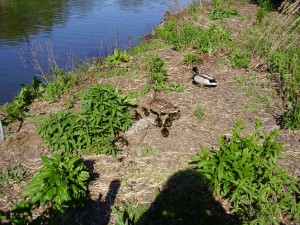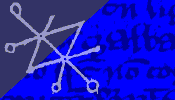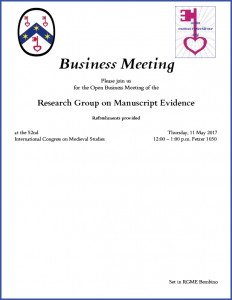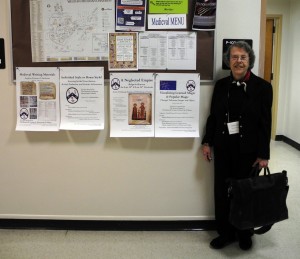2017 Congress Program
March 8, 2017 in Announcements, Conference, ICMS, International Congress on Medieval Studies, Kalamazoo, Uncategorized
The Research Group on Manuscript Evidence
at the
52nd International Congress on Medieval Studies
Western Michigan University, Kalamazoo, Michigan
11–14 May 2017
We announce the Programs for our Activities
Upon the publication of the complete Schedule for the 2017 International Congress on Medieval Studies, we now announce the Programs of our 5 co-sponsored Sessions and other Activities.
Upon completion of last year’s International Congress on Medieval Studies, we gave both a 2016 Congress Report and a special Behind the Scenes Report (Also Known As “Doctor Who Done It”). Then we turned to preparing for this year’s Congress.
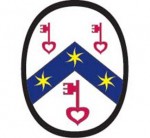 After our proposals for the 2017 sessions were accepted, our 2017 Call for Papers described the scope and aims of the sessions and invited proposals for their papers for consideration. Next, after the official closure of the Call for Papers on 15 September 2016, we selected the programs of the sessions, submitted them to the Congress Committee, and, in due course, announced these 2017 Congress Preparations.
After our proposals for the 2017 sessions were accepted, our 2017 Call for Papers described the scope and aims of the sessions and invited proposals for their papers for consideration. Next, after the official closure of the Call for Papers on 15 September 2016, we selected the programs of the sessions, submitted them to the Congress Committee, and, in due course, announced these 2017 Congress Preparations.
As the preparations for the Congress shift into the next phase, we will also, as customary, post the Abstracts for the Papers, as their authors permit. Note that our site conveniently lists the published Abstracts not only for the individual years of the Congress, but also in the Indexes both by Author and by Year. Thus we invite you to discover, even at a distance across time and space, the subjects, aims, and accomplishments of the presenters at the Sessions.
The 2017 Congress
As in recent years, we co-sponsor Sessions with
- the Societas Magica (2 Sessions) and
- the Center for Medieval and Early Modern Studies at the University of Florida (2 Sessions).
It will be the 12th year of this co-sponsorship with the Societas Magica, and the fourth year with the Center for Medieval and Early Modern Studies.
This year, for the first time, we also co-sponsor a Round-Table with a community of 5 other Co-Sponsors (including the Societas Magica), headed by
- AVISTA (The Association Villard de Honnecourt for the Interdisciplinary Study of Technology, Science, and Art).
Also, like the 2016 Congress, we plan for
- an Open Business Meeting and
- a co-sponsored Reception with the Index of Christian Art at Princeton University.
Glimpses of our co-sponsored Receptions at the Congress appear in the souvenirs of our Celebrations and in the Reports for the individual Congresses (2016, 2015, and 2014 Anniversary).
The Agendas for our Open Business Meetings in both 2015 and 2016 serve as concise Reports for our Activities, Plans, and Desiderata. Continuing to be popular downloads on our site, they speak for the progress of the work and aims of our organization.
Here we list the sessions in their scheduled order on the Congress Program.
We look forward to seeing you at the Congress. Please Contact Us with questions or suggestions.
Sessions
I. Co-Sponsored with AVISTA:
 The Association Villard de Honnecourt
The Association Villard de Honnecourt
for the Interdisciplinary Study of Medieval Technology, Science, and Art
et alia
1. Round-Table co-sponsored with AVISTA and these organizations:
- Medica: The Society for the Study of Healing in the Middle Ages
- DISTAFF: Discussion, Interpretation, and Study of Textile Arts, Fabrics, and Fashion
- EXARC: Archaeological Open Air Museums and Experimental Archaeology (International Organisation of Archaeological Open Air Museums and Experimental Archaeology)
- Societas Magica
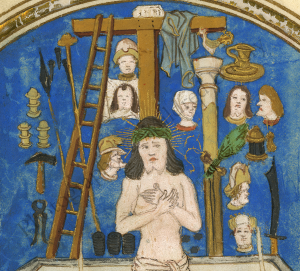
Tools of the Passion of Christ. From a late 15th-century manuscript illustration of the Vision at Mass by Gregory the Great. See our blog on ‘Manuscript Studies’. Photograph © Mildred Budny.
Medieval Tools
Congress Session 41
Thursday 10:00–11:30 a.m.
Sangren 1710
This round-table session aims to provide an opportunity for short presentations, demonstration, and discussion of medieval tools and technology. They may extend into various realms, including artistic production, agricultural labor, construction, shipbuilding, and household use. The co-sponsorship demonstrates the wide range of materials and methods which could come into view.
Organizer:
- Sarah Thompson (Rochester Institute of Technology)
Presider:
- Sean M. Winslow (University of Toronto)
Panelists:
- Constance H. Berman (University of Iowa)
- Carla Tilgman (Washburn University)
- Frank Klaassen (University of Saskatchewan)
- Linda Ehrsam Voigts (University of Missouri – Kansas City)
- Darrell Markewitz (Wareham Forge)
Our interest in this subject as a Congress Session flows naturally from our commitment to our occasional series of Sponsored Sessions on “Medieval Writing Materials” (as at the 2016 Congress).
*****
II. Co-Sponsored with
the Center for Medieval and Early Modern Studies
at the University of Florida
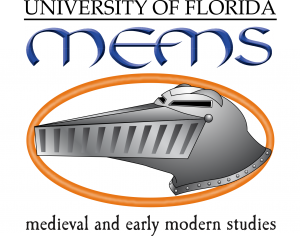 2 Sessions
2 Sessions
Co-organized by
Mildred Budny (Research Group on Manuscript Evidence)
and Florin Curta (University of Florida)
2. Rulership in Medieval Central Europe
(Bohemia, Hungary, and Poland):
Ideal and Practice
Congress Session 262
Friday 1:30 – 3:00 p.m.
Schneider 1360
Much has changed over the last 15 years or so in the study of political ideology, rituals, and symbols. The debate over ritual between Gerd Althoff and Philippe Buc has not taken into consideration the large body of literary evidence pertaining to court rituals and ideal representations of power in East Central Europe. On the other hand, this debate has only recently percolated to centers of historical research in that region. The results of those combined changes have not yet received closer scholarly scrutiny.
This session is meant to provide an overview of the most recent research on ideal rulership in theory and practice, with a particular emphasis on East Central Europe. Was the region different in that respect from Western Europe? Are there any specific features of the ideal representation of rulership in Bohemia, Poland, and Hungary? What are the most salient features of the ritual practice of power in the region?
Organizers:
- Mildred Budny (Research Group on Manuscript Evidence) and
Florin Curta (University of Florida)
Presider:
- Dušan Zupka (University of Oxford)
Presenters:
- Martin Wihoda (Masaryk University, Brno, Czech Republic)
“Rulership in Early Medieval Bohemia: Between Ideals and Everyday Reality”
Abstract of Paper - Vincent Múcska (Comenius University in Bratislava, Slovakia)
“Theory and Practice of Legitimizing Royal Power in Early Medieval Hungary: The Árpád Dynasty”
Abstract of Paper - Zbigniew Dalewski
(Tadeusz Manteffel Institute of History, Polish Academy of Sciences, Warsaw, Poland)
“The Plast Rulership: The Process of Building Dynastic Power”
Abstract of Paper - Paul W. Knoll (Department of History, Emeritus, University of Southern California)
“Royal Exercise of Political, Cultural, and Legal Leadership in Fourteenth-Century East Central Europe”
Abstract of Paper
[Update: We have learned that Zbigniew Dalewski will not be able to attend the Congress to present his paper. This change to the Program will be reported in the Corrigenda for the Congress Program, distributed at the Congress. Here, on our website, his Abstract may remain in place as a declaration of his intentions for the paper, as we respect his willingness to contribute to the explorations of the session and its subject of consideration.]
3. Military Orders and Crusades in Comparative Perspective
(The Levant, Spain, and the Baltic Region)
Session 321
Friday 3:30 – 5:00 p.m.
Schneider 1360
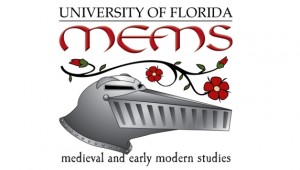 Renewed interest in the history of the military orders has resulted in a rapid proliferation of studies dedicated to the Templars, Hospitallers, and the Teutonic Knights, but no synthesis dedicated to minor orders, such as Calatrava or the Brothers of the Sword. Meanwhile, a particular sub-field of medieval archaeology dedicated initially to crusader castles in the Levant has begun to draw attention to similar phenomena in the Baltic region, inviting comparison. Aleksander Pluskowski‘s Archaeology of the Prussian Crusade (2013) is the first book to compare systematically the Holy Land and the Baltic region. Missing, however, is a comparison with the Iberian Peninsula.
Renewed interest in the history of the military orders has resulted in a rapid proliferation of studies dedicated to the Templars, Hospitallers, and the Teutonic Knights, but no synthesis dedicated to minor orders, such as Calatrava or the Brothers of the Sword. Meanwhile, a particular sub-field of medieval archaeology dedicated initially to crusader castles in the Levant has begun to draw attention to similar phenomena in the Baltic region, inviting comparison. Aleksander Pluskowski‘s Archaeology of the Prussian Crusade (2013) is the first book to compare systematically the Holy Land and the Baltic region. Missing, however, is a comparison with the Iberian Peninsula.
The session is meant to bridge that gap and to invite more discussion around the regional experiences of one and the same order (e.g., the Teutonic Knights in the Levant, Transylvania, and Prussia) or between different orders in different regions (e.g., the Order of Calatrava and the Brothers of the Sword in Spain and in Livonia respectively). The material culture and the multiple studies based on the archaeology of the landscape (that go far beyond the analysis of single castle sites) offer a very rich ground for comparative work, but most archaeologists working in the Prussian lands do not read the literature on castles in Spain, and vice-versa.
Thus, the session is meant to illustrate what can be done to revise the historical record through the already exceptional amount of information available from archaeological excavations. Considering comparative work on the military orders in crusade, both within specific orders and among them, and both within specific regions and across them, may bring to light unexpectedly shared issues, questions, and potential for enriched understanding.
Organizers:
- Mildred Budny (Research Group on Manuscript Evidence) and
Florin Curta (University of Florida)
Presider:
- Florin Curta (University of Florida)
Presenters:
- Andrew Holt (Florida State College at Jacksonville)
“The Templars and the Confraternity of Belchite: A Comparison of Origins”
Abstract of Paper - James G. Schryver (University of Minnesota – Morris)
“An Archaeology of the Military Orders in the Holy Land?”
Abstract of Paper - Geoffrey Leighton (Cardiff University)
“Intraverunt terram horroris et vaste solitudinis:
The Teutonic Order and Landscape Sacralization in the Crusade to Prussia”
Abstract of Paper
*****
III. Co-Sponsored with the Societas Magica
4. Manuscripts to Materials
Friday 12 May
Bernard 208
6:30 – 7:00 p.m.
To practice learned magic in the pre-modern world one could not simply go to a store or take a course. It was certainly far more complicated than slavishly following a set of techniques. A would-be practitioner had to acquire manuscripts, interpret them, then acquire the prescribed ingredients and build the necessary equipment based on the written instructions. Once this was accomplished and the processes completed, the results were at once highly evocative and ambiguous, requiring interpretation. Thus at two stages highly creative and imaginative processes had to be called upon. This session + display exhibition (focused on hands-on re-creations of ancient and medieval divination techniques) will examine the intersection between the creative and the learned in pre-modern magical practice.
Organizer:
- David Porreca (Department of Classical Studies, University of Waterloo)
Presider:
- Jason Roberts (University of Texas – Austin)
Presenter:
- Frank Klaassens (College of Arts and Science, University of Saskatchewan)
Respondents:
- Claire Fanger (Rice University)
- David Porreca
- Marla Segol (State University of New York at Buffalo)
5. Islamic Magic: Texts and/as Objects
Session 515
Sunday 14 May
8:30 –10:00 a.m.
Schneider 1275
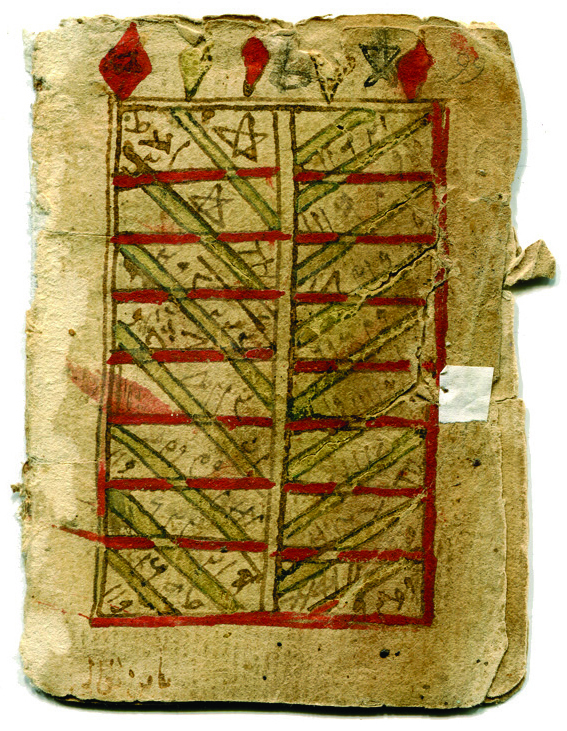
First recto of a fragmentary bifolium in Arabic on paper, from a small manuscript, circa 16th century CE. Text probably occult. See our Gallery of ‘Scripts on Parade’.
Despite the recent burgeoning of the field of Islamic occultism, the vast majority of manuscripts dealing with astrology, various forms of magic and divination, and ecstatic practices remain untapped. Such objects represent a primary basis for both the intellectual and material-cultural history of Islamic civilization, and show the interdependence of these categories; they further require the recovery of discourses heretofore elided in modern scholarship on Islamic history. This session, which introduces a number of newly discovered Arabic manuscripts, highlights the special status of these manuscripts as texts and evocative objects, with particular attention to their visual elements.
Organizer
- Liana Saif (Faculty of Oriental Studies, University of Oxford)
Presider:
- Liana Saif
Presenters:
- Nicholas G. Harris (University of Pennsylvania)
“Books as Robots: Authorship and Agency in Islamicate Alchemical Manuscripts” - Edgar Francis, IV (University of Wisconsin – Stevens Point)
“Approaching Shams al-ma’arif al-kubrá through Early Manuscripts: MSS Arabe 2650–51 in the Bibliothèque nationale de France”
Abstract of Paper - Travis Zadeh (Yale University)
“Legible Signs? Cyphers, Talismans, and the Theologies of Early Islamic Sacred Writing”
Respondent:
- Noah G. Gariner (University of South Carolina – Columbia)
*****
 Research Group on Manuscript Evidence
Research Group on Manuscript Evidence
2017 Open Business Meeting
Thursday 11 May
12:00 – 1:00
Fetzer 1030
All are welcome. Refreshments will be provided.
The downloadable Agendas for our Open Business Meetings in both 2015 and 2016 serve as concise Reports for our Activities, Plans, and Desiderata.
*****
 Reception with hosted bar
Reception with hosted bar
Co-sponsored with the Index of Christian Art at Princeton University
Friday 12 May
5:15 – 7:30 p.m.
Bernhard G10
*****
Other Activities of our Co-Sponsors at the Congress
Other activities of our co-sponsors at the Congress include these:
I. Societas Magica
1. Session 131
Sex Magic: Past and Present, Imagined and Real
Thursday 3:30 – 5:00 p.m.
Presider: Mildred Budny
2. Reception with hosted bar
Friday 12 May
Bernhard 208
8:00 p.m.
3. Business Meeting
Saturday 13 May
11:45 a.m.
Fetzer 1055
II. CMERS at the University of Florida
1–2. Sessions 23 and 70
Archaeology of Medieval Europe, I and II
- History and Politics in Medieval Archaeology
Thursday 11 May
10:00 – 11:30 a.m.
Schneider 1335 - Bioarchaeological Research on Eastern Europe
Thursday 11 May
1:00 – 3:00 p.m.
Schneider 1335
III. AVISTA
Business Meeting
Saturday 13 May
12:00
Schneider 1125
IV. Index of Christian Art at Princeton University
1–2. Sessions 280 and 325 In Honor of Adelaide Bennett Hagens, I and II
- Text–Image Dynamics in Medieval Manuscripts
Friday 12 May
1:30 – 3:00 p.m.
Sangren 1750 - Signs of Patronage in Medieval Manuscripts
Friday 12 May
3:30 – 5:00
Sangren 1750
The honoree is our colleague, friend, and Trustee. We celebrate her accomplishments with her Page: Adelaide Bennett Hagens.
*****
Please Contact Us with your questions and suggestions. For our nonprofit educational mission, with tax-exempt status, donations in funds and in kind (expertise, materials, time) are welcome.
*****

